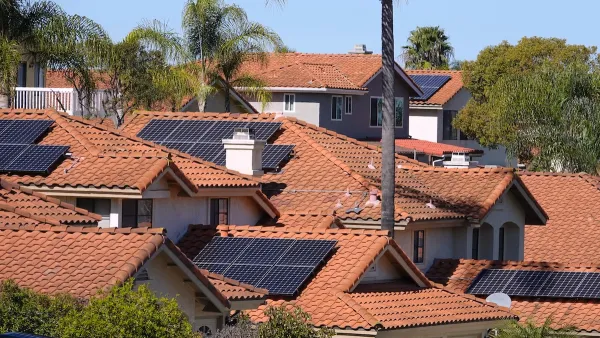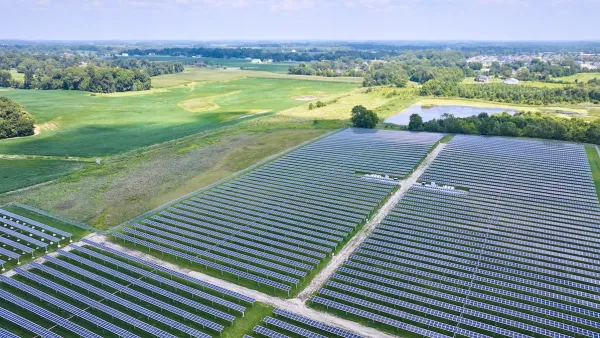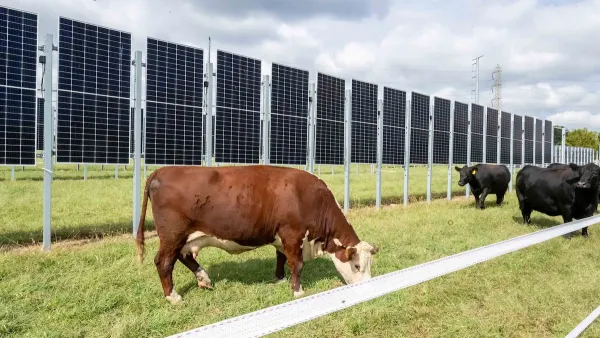Energy storage is acknowledged by many as a missing link of renewable energy, particularly by those quick to cite the intermittency of solar and wind power. A new solar thermal plant in Arizona stores energy in the form of heat for peak hour needs.
Matthew L. Wald writes about "a closely watched new solar project called Solana" in the Arizona desert built by Abengoa Solar. Unlike conventional solar plants that produce electricity for transmission to energy-hungry, metropolitan markets, Solana is also a cutting-edge, energy storage facility relying on "huge tanks of molten salt" to store heat from its "sprawling network of parabolic mirrors...in a three-square-mile patch of desert". It will sell its renewable energy, including the electricity it produces at night, to the utility, Arizona Public Service.
When the sun has set, the plant can draw heat back out of the molten salt to continue making steam and electricity...The emerging technology is one way that the utility industry is trying to make electricity from the sun available even when it is not shining, overcoming one of the major shortcomings of solar power.
If you thought that energy storage was solely the province of batteries, think again. Wald writes that "several (renewable power) plants have added banks of electric batteries. But battery storage is so expensive that these have been used mostly to smooth the output of the plant, not to store huge amounts overnight."
Batteries work great in electric cars because of the relatively high cost of gasoline. Solar has to compete with much cheaper power from coal and natural gas.
In neighboring California, another breakthrough of sorts is being watched, though this one is regulatory.
"In a bold move being closely watched by utilities, environmentalists and the clean technology industry, California on Thursday [Oct. 17] adopted the nation's first energy storage mandate", writes Dana Hull of the San Jose Mercury News.
(The) California Public Utilities Commission unanimously approved (a) groundbreaking proposal [PDF] that requires PG&E, Southern California Edison and San Diego Gas & Electric to expand their capacity to store electricity, including renewable energy generated from solar and wind.
"Storage really is the game changer in the electric industry. And while this new policy is not without risk, the potential rewards are enormous," said Commissioner Mike Florio.
Solar advocates will not be the only ones watching the Solana plant. With a $1.45 billion loan guarantee from the Department of Energy, skeptics will also also be tracking its progress.
FULL STORY: Arizona Utility Tries Storing Solar Energy for Use in the Dark

National Parks Layoffs Will Cause Communities to Lose Billions
Thousands of essential park workers were laid off this week, just before the busy spring break season.

Retro-silient?: America’s First “Eco-burb,” The Woodlands Turns 50
A master-planned community north of Houston offers lessons on green infrastructure and resilient design, but falls short of its founder’s lofty affordability and walkability goals.

Delivering for America Plan Will Downgrade Mail Service in at Least 49.5 Percent of Zip Codes
Republican and Democrat lawmakers criticize the plan for its disproportionate negative impact on rural communities.

Test News Post 1
This is a summary

Test News Headline 46
Test for the image on the front page.

Balancing Bombs and Butterflies: How the National Guard Protects a Rare Species
The National Guard at Fort Indiantown Gap uses GIS technology and land management strategies to balance military training with conservation efforts, ensuring the survival of the rare eastern regal fritillary butterfly.
Urban Design for Planners 1: Software Tools
This six-course series explores essential urban design concepts using open source software and equips planners with the tools they need to participate fully in the urban design process.
Planning for Universal Design
Learn the tools for implementing Universal Design in planning regulations.
EMC Planning Group, Inc.
Planetizen
Planetizen
Mpact (formerly Rail~Volution)
Great Falls Development Authority, Inc.
HUDs Office of Policy Development and Research
NYU Wagner Graduate School of Public Service





























